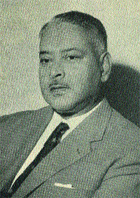
Chief Justice Cornelius. Public domain image.
[I] am slowly beginning to understand what is built into the Constitution of Pakistan, in the way of political obligation … I have learnt that a non-Muslim can only be a full citizen of Pakistan if, on the secular side, he conforms to the requirements of the Objectives Resolution, read with the first 8 Articles, that is Parts I (the Republic of Pakistan) and II (Fundamental Rights and Principles of Policy). So far as I can see, at present, this is entirely possible, and would be easy, if there were some formulation of the basic principles contained in the Scriptures of Islam, in regard to equality, tolerance, social justice etc.
These are the words of Alvin Robert Cornelius (1903-1991), one-time Chief Justice of Pakistan, in a personal letter dated July 1965. A practising Christian, he was one of the many people who supported the Pakistan idea. He was also amongst the few who understood the content of the Objectives Resolution as a statement of universal human ideals and one that made great promises to all its citizens regardless of caste and creed. But, he said, these ideals hadn’t been spelled out.
AN OVERLOOKED ISSUE
And Cornelius wasn’t the only person to say this. Two other Pakistanis (Mian Iftikharuddin and PD Bhandara, father of MP Bhandara) also made similar remarks in criticism of Pakistan’s constitution-making body during Pakistan’s fledgling years. All three of these individuals stated in no uncertain terms that some fundamental principles had not been accounted for. Iftikharuddin complained in 1949 that the Objectives Resolution didn’t …
… incorporate those principles which will make real democracy possible …
– and PD Bhandara said in 1954:
The very essence of an Islamic Constitution which is brevity and simplicity is conspicuous by its absence. … In the process of evolution gained by experience, I trust our Constitution will be remodelled to conform more to the tenets of Islam …
But their words went unheeded, and with time the Objectives Resolution became an issue of enormous contention.
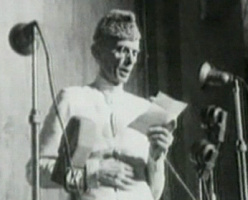
MA Jinnah on 14 August 1947, and not 11 August as shown on Wikipedia. Image from my personal collection.
Critics of the Objectives Resolution see it as some sort of backdoor to theocracy, even though a religious state was the last thing on the minds of those who penned it. MP Bhandara’s 11 August 1947 bill (introduced in 2006) was an attempt to insert one of Jinnah’s most famous speeches on civil equality alongside the Objectives Resolution in the constitution. Bhandara said the speech would act as an ‘ideological balance’. Ironically, unlike his father, MP Bhandara had actually misinterpreted the Objectives Resolution and his bill (his version of it, anyway) was only going to make things worse by causing a conflict. I tried to tell him this, but I don’t think he heard me.
THREE WORDS
All this made me think of the theorem. By now I saw the connection to the three words in Iqbal’s Reconstruction – the three basic ideals of equality (justice), solidarity (unity), and freedom (liberty). That passage of Iqbal became my muse. Even Jinnah had been subconsciously drawn to these three ideals, which was why he quoted the French equivalent liberté, égalité, fraternité (liberty, equality, fraternity) several times during those last few months of his life as Pakistan’s first Governor General.
By 2009, a publisher in the UK and another in Pakistan had both already offered me a contract for SJ1’s revised edition. They expected me to get it to them in a few weeks. It took me 14 months, and thankfully both publishers were very patient with me. By the time it was finished, SJ2 was a brand new book containing new and original research, and only parts of it coincided with SJ1.
LEFT UNSAID
 In SJ2, I briefly mentioned this ‘missing’ element of Pakistan’s constitution, and even said that my old appendix (imported from SJ1 and improved in SJ2) contained the very same ‘core principles’ of the Quran that could help complete the constitutional work begun back in 1949. What I didn’t mention – though I discussed it with one or two people including a prominent Pakistani retired senior judge – was that I also had an idea for a bill that could introduce the same ideals as those listed in my old appendix, the source of the theorem. To my mind the introduction of binding, interconnected values would not only strengthen and clarify the promises made in the Objectives Resolution, but would also put an end to the misinterpretation of what it contains.
In SJ2, I briefly mentioned this ‘missing’ element of Pakistan’s constitution, and even said that my old appendix (imported from SJ1 and improved in SJ2) contained the very same ‘core principles’ of the Quran that could help complete the constitutional work begun back in 1949. What I didn’t mention – though I discussed it with one or two people including a prominent Pakistani retired senior judge – was that I also had an idea for a bill that could introduce the same ideals as those listed in my old appendix, the source of the theorem. To my mind the introduction of binding, interconnected values would not only strengthen and clarify the promises made in the Objectives Resolution, but would also put an end to the misinterpretation of what it contains.
And what happened after that? Well, the idea remains an idea. In the end, I made it – the theorem, that is – ‘real’ only in my fictional universe. But there it makes for useful commentary on the human condition … and it’s my way of paying homage to the Pakistan idea.
This is the final part. Earlier posts in this mini-series:
Introduction … Pt 1: The first book …
Pt 2: Libredux … Pt 3: The missing principle
(Some images in this post are copyrighted)



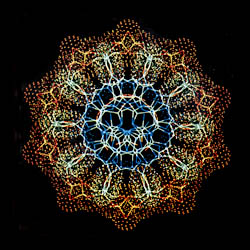
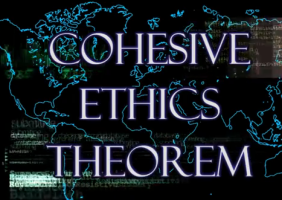
 Meanwhile my novel was developing slowly. I had an idea for an experiment that would simulate history and test social systems, including an ‘ideal’ one. Computer simulations are commonly used for predicting weather patterns and observing changes in ecosystems. To my mind a social system simulation seemed perfectly feasible – more feasible, than say, trying to set up an experimental ideal society within an existing country where all sorts of practical obstacles would get in the way. A simulation would provide a controlled environment and in fact would be a more reliable test. In the novel, the Systems Experiment would prove that an ideal society was possible, and then the bad guys would go and ruin it all … as they always do. 🙂
Meanwhile my novel was developing slowly. I had an idea for an experiment that would simulate history and test social systems, including an ‘ideal’ one. Computer simulations are commonly used for predicting weather patterns and observing changes in ecosystems. To my mind a social system simulation seemed perfectly feasible – more feasible, than say, trying to set up an experimental ideal society within an existing country where all sorts of practical obstacles would get in the way. A simulation would provide a controlled environment and in fact would be a more reliable test. In the novel, the Systems Experiment would prove that an ideal society was possible, and then the bad guys would go and ruin it all … as they always do. 🙂
 The first book I ever started – long before even SJ1 – was fiction. For a long time I had notions about the emotional content, and that it should be an epic. I even developed the characters, and knew that the story would contain a quest for a valuable item, but otherwise there was no solid plot. It refused to come together because it lacked focus. The thing had a beating heart, but no brain. Or maybe it was the other way round.
The first book I ever started – long before even SJ1 – was fiction. For a long time I had notions about the emotional content, and that it should be an epic. I even developed the characters, and knew that the story would contain a quest for a valuable item, but otherwise there was no solid plot. It refused to come together because it lacked focus. The thing had a beating heart, but no brain. Or maybe it was the other way round.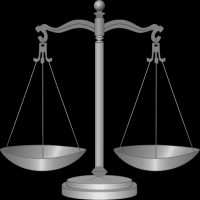
 … And so on. But I soon realised that most of these items could be grouped together by their corresponding ideal. The first two of the above list could be grouped together under the ideal value ‘freedom’, and the latter three under ‘justice’. I also recall thinking that many (if not most) of these and similar principles could be classified both under freedom and justice. In fact these two seemingly separate ideals are ultimately united, but I hadn’t recognised this yet. Nor did I know that this was the germ of the idea for what would later become the Cohesive Ethics Theorem.
… And so on. But I soon realised that most of these items could be grouped together by their corresponding ideal. The first two of the above list could be grouped together under the ideal value ‘freedom’, and the latter three under ‘justice’. I also recall thinking that many (if not most) of these and similar principles could be classified both under freedom and justice. In fact these two seemingly separate ideals are ultimately united, but I hadn’t recognised this yet. Nor did I know that this was the germ of the idea for what would later become the Cohesive Ethics Theorem.

